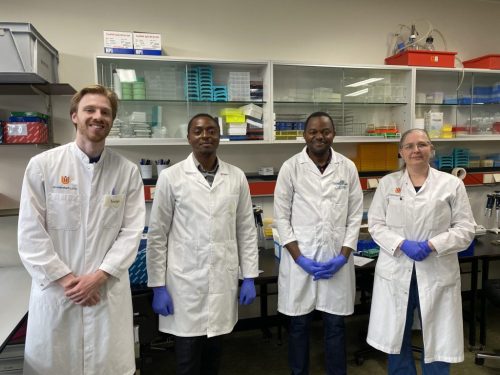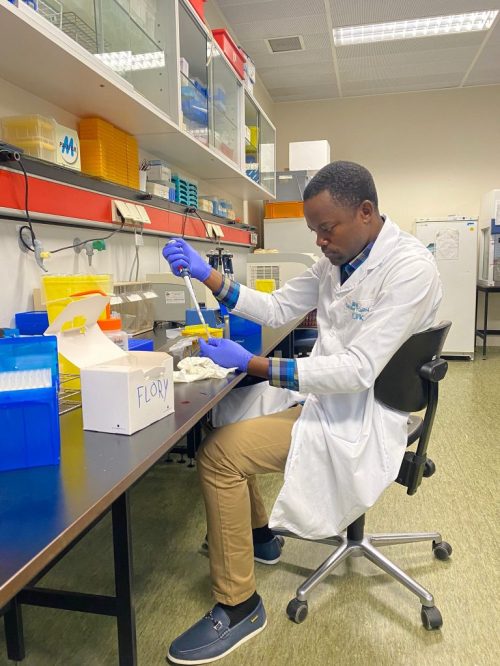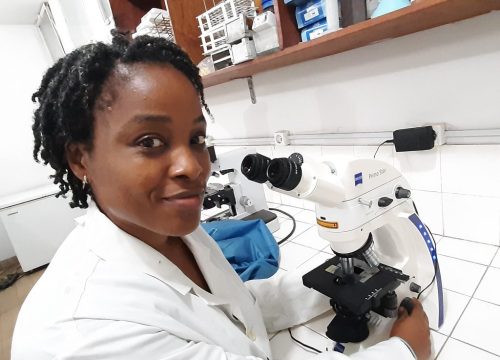This study is embedded to PYRAPREG study in the Democratic Republic of the Congo. It was developed with the support of the work package 4 (capacity building) and it is led by Dr Vivi Maketa, who obtained an EDCTP grant and Novartis (reference: TMA2019CDF-2699) for career development. The very first participant was enrolled on 6th May 2021.
Comparison of intermittent screening (using ultra-sensitive malaria Rapid Diagnostic test) and treatment (using a newly registered antimalarial Pyronaridine – Artesunate – PYRAMAX®) to standard intermittent preventive treatment with sulfadoxine-pyrimethamine for the prevention of malaria in pregnant women living in endemic areas.

In endemic settings Plasmodium falciparum (Pf) can sequester in the placenta resulting in low peripheral parasitemia and false negative malaria diagnosis in pregnant women. Intermittent Preventive Treatment in pregnant women with Sulphadoxine-Pyrimethamine (IPTp-SP) is one of the World Health Organization’s recommended malaria control strategies in sub-Saharan African countries.
The strategy overcomes the risk of misdiagnosis of malaria in pregnant women by treating them all with SP according to predetermined schedules, but the strategy is now threatened by the spread of Plasmodium parasite resistant strains.
As a necessary alternative, Intermittent Screening and Treatment in pregnancy (ISTp), aims on the monthly screening of pregnant women with a malaria rapid diagnostic test (RDT) and the treatment of positive cases with artemisinin-based combination therapy (ACT) regardless of the presence of symptoms. The ISTp depends on the performance of the diagnostic tests, and the use of ultrasensitive RDTs (us-RDTs), which have a higher analytical sensitivity than conventional RDTs, should improve the efficacy of the strategy.
Contrairement au TPIp-SP, l’ISTp empêche la surutilisation des antipaludéens et limite ainsi la pression médicamenteuse sur les parasites du paludisme. Cet avantage pourrait être potentialisé en utilisant, pour les femmes enceintes, une ACT qui n’est pas encore utilisée ou qui ne devrait être utilisée sur le terrain que pour d’autres couches de la population.
La nouvelle combinaison ACT récemment approuvée, Pyronaridine – Artesunate (Pyramax®) est le candidat idéal pour cet usage.
Cette étude comparera les effets de l’ISTp utilisant un us-TDR et Pyramax® (ISTp-US-Py) avec le TPIp-SP standard sur les indicateurs du paludisme maternel (infection palustre, densité parasitaire), l’anémie maternelle, les avortements spontanés ou les décès intra-utérins pendant la grossesse, la morbidité fœtale (naissance prématurée, faible poids de naissance, petit pour l’âge gestationnel) et la mortalité néonatale à l’accouchement dans les deux groupes d’étude en menant un essai clinique randomisé enrôlant des femmes enceintes au deuxième trimestre au centre de santé Esengo, situé à Kisenso, Kinshasa, République Démocratique du Congo (RDC), une zone de transmission pérenne du paludisme.
Les résultats générés par cette étude seront essentiels pour le Programme National de Lutte contre le Paludisme dans la sélection et la mise en œuvre de nouvelles politiques de lutte contre le paludisme, et résoudront l’efficacité du TPIp-SP en déclin chez les femmes enceintes en RDC et dans d’autres pays endémiques.


Trainings
En Juin et Juillet 2022, Flory Luzolo le coordonateur de site de l’étude, accompagné par Japhet Kabalu (le Coordonateur de site de l’étude PYRAPREG RDC) ont passé un séjour de recherche au Centre Médical Académique, à l’Université d’Amsterdam, où ils avaient appris quelques techniques de biologie moléculaire. Ils avaient analysé par la réaction en chaîne polymérase quantitative les échantillons de sang séchés sur papier filtre prélevés dans l’étude.
